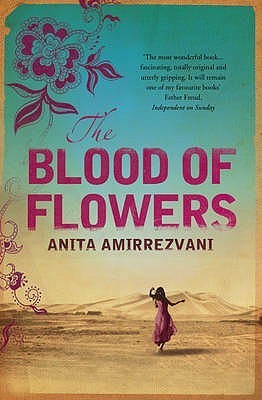Comment: I've probably added this book to my TBR list because it would feature a young woman trying to have a good life at a time and place where women, traditionally, only seem to be able to follow very limited choices in their lives. Added to that, this is an historical novel, therefore it would contain even more difficulties for our heroine....
In the Iran of the 17th century, which was known as Persia (especially among foreign scholars), the life of young girls is determined by their family and position in the social hierarchy. When the protagonist's father dies, she and her mother leave their small village and travel to the big city, where an uncle will help them, as is traditional. The protagonist is sad to leave what she knows but her uncle is a successful carpet maker who also works for the Shah Abbas, which means he will be able to provide. Besides, she hopes to work in carpets as well, for she has the ideas and the will, just not the money. This will be quite an obstacle and she has her mother to think of as well, but perhaps all will change when the family receives a marriage proposal, even though she doesn't have a dowry... but is the proposal a decent one? What about her dreams and hopes for a better life?
This is the first time I've tried a book by this author. I liked the style of her writing because it was fluid and easy and I think she was able to convey drama and eagerness at the right levels. The theme is also interesting, obviously it's something she is comfortable writing about and it was also clear that she used several academic - and not only - sources to base a lot of information used in the plot. I did like the notes included at the end about the ideas she had and what work she used to include facts about the Shah Abbas, a real person and revered at the time.
Another wonderful element is the plenty descriptions and information about the carpets and how they are done and why certain techniques and choices in pattern are done.. Having some (different) tradition in my country of hand made carpets in certain regions, some aspects weren't hard to imagine or understand, but it must something special to see an artist work in these rugs... and one wonders sometimes why they can be so expensive! The hours and amount of detail put into each one alone!
Basically, all the historical and technical details used here did enrich the novel and I was quite engrossed in knowing all the interesting things, especially because a lot of the content was based on realistic situations. The fictional parts are always up to each reader, but I liked what was going on well enough... in an historical focused on women and their position in life when women's rights were not even a thing, of course our contemporary notions and beliefs are certainly challenged...and the protagonist faced many situations that feel unfair and humiliating now.
The author didn't name the protagonist and that is a choice she explained as well. I confess I liked the justification a lot, but it does make it complicated to write about the young girl without a name. She traveled with her mother as a young girl, I can't remember exactly how old but despite still being a child to our contemporary laws, she was at an age where marriage is already a possibility. I won't go into that subject but let if be said that to a girl at that time the idea of marriage was acceptable and we see she longs to have someone her father would respect and be happy to give her to.
Of course things don't go as smoothly as that and I think the author has thought of a very likely scenario for how this young girl's life went in a unusual road, and one with many disappointments. Some passages were hard to read, not because they're violent or anything, in fact the author doesn't go into very graphic details, but because it's nearly impossible to ignore western and contemporary knowledge and sense of what is right and acceptable and then think about the likeliness so many girls went through situations like this protagonist (and many still do everywhere I'm sure) and it was expected of them to allow others to make decisions for them, because of tradition and so many other factors (finances, usually).
The protagonist maintains her personality and dreams but she also gives in to what is expected of her by those who decide for her, by society norms, by financial reasons... it's hard to not feel anger at some of the things she endures, even if those things would have been mundane for people back then. But thankfully, the author wanted to express how special the protagonist was, how much of an artist she was in relation to the carpets and how much dignity she had to conserve, in spite of what she had to do but didn't really want if she could choose.

No comments:
Post a Comment